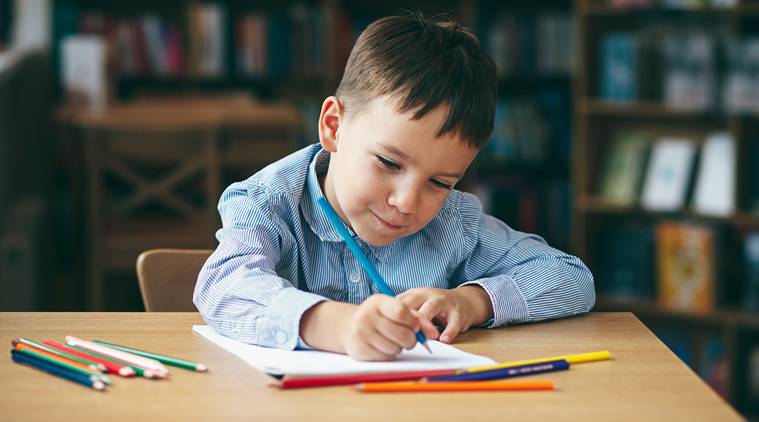How to encourage your child to take up creative writing
Creative writing can be a fulfilling pursuit for a student. Even if parents don’t see a direct benefit to their child’s academic curriculum, writing is one of those elemental quests that will make your child more self-aware.
 Allow kids to express themselves. (Source: Getty Images)
Allow kids to express themselves. (Source: Getty Images)
By Kartik Bajoria
As parents, we have a unique opportunity to provide a holistic, balanced upbringing for our children. While we create an environment at home and school that spurs academic excellence, we must also try and inspire children’s imagination and creativity. A wonderful way of doing this is to encourage children to be creative writers. Not only does creative writing make children better communicators, it presents a multitude of advantages.
A life skill
Creative writing can become an invaluable life skill that will aid your child in expressing his or her thoughts, both at school and later in several professional situations too. Effective communication is the bedrock of success in most spheres of life, and to give children a headstart on this skill can prove critical.
Being imaginative
While creative writing might begin as a hobby, certain children will display clear signs of being genuinely inventive writers. In a world where we need more people to become thinkers, writers and influencers, you as a parent, will be doing a service to not just your own child, but society at large, by nurturing writers of a younger generation.
Gaining confidence
If we can nurture our children to be good writers, they will soon find appreciation for their talent. And the moment they are acknowledged at home and at school for their writing skills, it will play directly into enhancing their self-confidence and self-worth. Too many children there days are struggling to carve a niche for themselves and writing can prove to be that one facet of their personalities that they are known and celebrated for.
A tool for wellbeing
In today’s over-competitive, high-pressure schooling environment, kids struggle to be noticed. They often find it hard to cope, to stand out, to be noticed, and to be validated at home and at school. Writing is a habit that can alleviate the stresses of modern-day childhood. Writing, as is well chronicled and acknowledged, is a form of therapy. If a child can imbibe the habit of writing regularly, not only will this be a creative vent, it can also prove to be a highly effective therapeutic tool.
There are, however, some myths that many of us as parents entertain when it comes to creative writing. We feel that unless our kids meet certain prerequisites, they do not make the cut. We need to therefore be aware of these myths and rid our minds of these notions.
Ability to express simply and clearly
There is a common misconception that in order to write a compelling, engaging piece of fiction (in particular), one needs to be some kind of language pundit. This is untrue. The point of good writing is not to use big, flowery words. Sure, it helps to have a wider vocabulary at one’s disposal, but having said that, it is not really necessary. Many parents assume that in order for their kids to write, the children must be ‘language-lavish’, which rather than serving the purpose of the story, draws attention and focus away from it!
Many parents also harbour the notion that our children must be avid readers of literary works in order to write. Sure, reading helps. But like a dear author friend of mine always says, reading too much cramps his originality!
Stimulating environment
When the child does express an interest in writing, some parents may worry that he or she may not have experienced life enough for it to reflect in their work. However, they must remember that it isn’t the ‘action’ or ‘events’ that get us hooked to a story, but its primary characters. Great stories are much less about what’s going on ‘outside’ and more about the interior life of a person.
To really spur our kids to write well and write creatively, there are a few suggestions that we can keep in mind.
Keep an open mind
Approach creative writing with an open mind; one cannot be closed off in the least. One must surrender entirely. Holding back one’s feelings or emotions, being guarded about one’s positive or negative thoughts, being bothered by judgment or concerned with how one will be perceived are all factors that will prevent one from truly engaging as a writer and creator.
Being truthful
Great writing doesn’t necessarily come from great narrative. It comes from a place of honesty. One must therefore be transparent in one’s observations and in the portrayal of one’s characters and incidents. There are only so many plots and so many stories out there. What differentiates a great piece of writing from a relatively less engaging piece of writing is the ‘honesty’ with which it has been written. This means that one’s characters must be extremely real and well-known to the writer, as must the situations. Anything that does not seem convincing to the writer will jump off the page and seem contrived. One must write about things and people that one is intimately familiar with. Create worlds that one has experienced, lived and inhabited. That is not to say that one cannot write about people, things and places that are outside of one’s realm; it requires genuine inquiry and research. No half truths here.
Writing via suggestion
At school, one hears this from teachers all the time — ‘be descriptive, be creative in one’s writing’. What does this really mean? In my own perception, it means one very simple thing. Write observations, not feelings. If we describe an observation, it will automatically convey the emotion, that too in a vivid, immersive manner. It is one thing for instance to say “Ram felt incredibly nervous”, and quite another to say, “Beads of sweat formed on Ram’s forehead. His toes twitched in his Kolhapuri chappals like prisoners wanting to break free from their fleshy-confines.” It’s obvious what makes for more engaging reading, while leaving something for the reader to infer, rather than being presented the ‘whole truth’ in words. If one can get into the habit of writing though describing situations, one will have addressed this third and final suggestion to enable great creative writing.
Creative writing can be a most fulfilling, immersive, creative, cathartic pursuit for a young student. Even if parents don’t see a direct benefit to their child’s academic curriculum, writing is one of those elemental quests that will make your child more whole, accomplished, self-aware and ultimately, happier.
(Writer, educator and moderator, Kartik Bajoria holds workshops on creative writing and personality development at various schools.)
- 01
- 02
- 03
- 04
- 05































